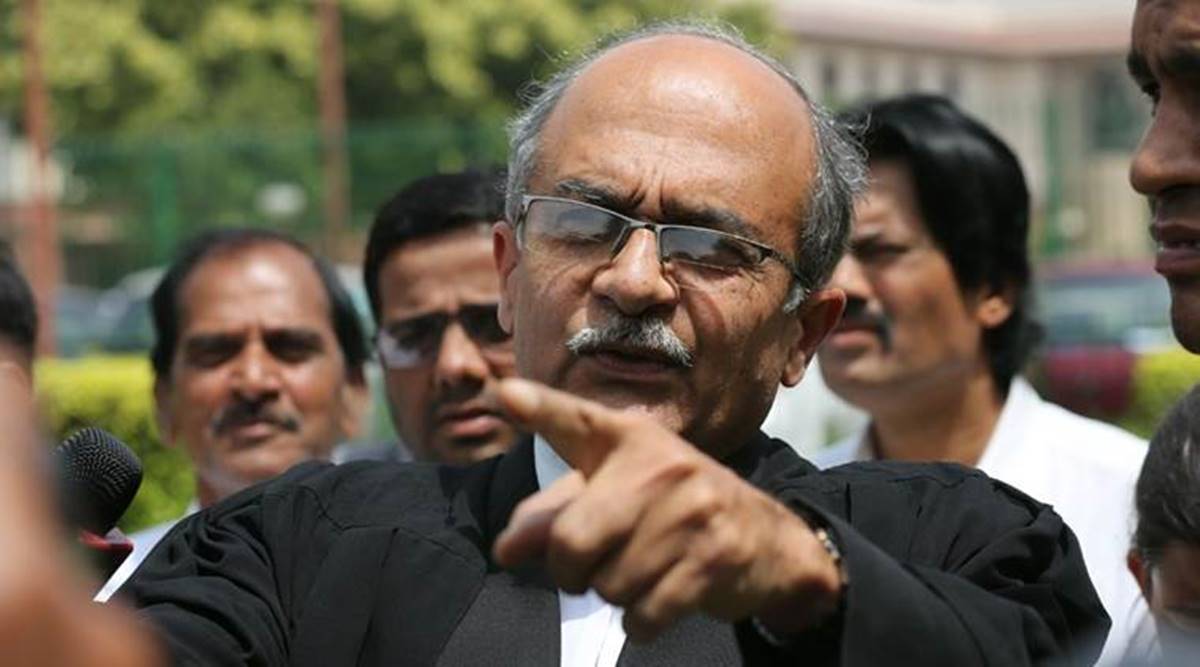 On August 14, the Supreme Court held Bhushan guilty of criminal contempt for two of his tweets. (File)
On August 14, the Supreme Court held Bhushan guilty of criminal contempt for two of his tweets. (File)A DAY before the Supreme Court hears arguments on the quantum of punishment to be awarded to advocate Prashant Bhushan for contempt of court, former SC judge Justice Kurian Joseph on Wednesday said the matter should be heard by a Constitution Bench and called for an “intra-court” appeal in the case.
“Under Article 145(3) of the Constitution of India, there shall be a quorum of minimum five Judges for deciding any case involving substantial questions of law as to the interpretation of the Constitution. In both the suo motu contempt cases, in view of the substantial questions of law on the interpretation of the Constitution of India and having serious repercussions on the fundamental rights, the matters require to be heard by a Constitution Bench,” he said in a statement.
“A three-Judge bench of the Supreme Court of India has decided to hear a few serious questions on the scope and extent of contempt of court. Certainly, there are more graver issues, involving substantial questions of law as to the interpretation of the Constitution of India. For example, whether a person convicted by the Supreme Court of India in a suo motu case should get an opportunity for an intra-court appeal since in all other situations of conviction in criminal matters, the convicted person is entitled to have a second opportunity by way of an appeal,” said Justice Joseph.

“Under Section 19 of the Contempt of Courts Act, 1971, an intra-court appeal is provided where the order is passed by the single Judge of the High Court, and, in case it is by the Division
Bench, appeal lies to the Supreme Court of India. This safeguard is provided probably to avoid even the remotest possibility of miscarriage of justice. Should there not be such a safeguard in the other Constitutional Court, the Supreme Court of India also, when there is a conviction in a suo motu criminal contempt case,“ he said.
“Fiat justitia ruat caelum (let justice be done though the heavens fall) is the fundamental basis of administration of justice by courts. But, if justice is not done or if there is miscarriage of justice, heavens will certainly fall. The Supreme Court of India should not let it happen,” he said.
“The present contempt cases are not cases involving just one or two individuals; but larger issues pertaining to the concept and jurisprudence of the country regarding justice itself. Important cases like these need to be heard elaborately in a physical hearing where only there is scope for a broader discussion and wider participation. Men may come and men may go, but the Supreme Court of India should remain forever as the court of supreme justice,” he said.
Referring to the contempt proceedings against Justice C S Karnan (then a sitting high court judge), Justice Joseph said “it was the collective wisdom of the full court of the Supreme Court that the matter should be heard at least by a bench consisting of the seven senior-most Judges”.
On August 14, the Supreme Court held Bhushan guilty of criminal contempt for two of his tweets.
Meanwhile, Senior Advocate Indira Jaising asked if the decision of the three-judge bench was shared by all judges of the Supreme Court.
Speaking at an event organised by Indian American groups expressing solidarity with Bhushan, Jaising called for a review of the ruling by a full court of the Supreme Court.
Bhushan also tweeted a statement by Opposition leaders including Digvijaya Singh, Shashi Tharoor and Farooq Abdullah, in which they said that the court’s decision had caused “a chilling effect on free speech and expression of dissent.” “It is sad that the honourable court has not found it necessary to distinguish between constructive criticism and malicious statement,” the statement said.